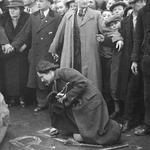Wissenschaft des Judentums: Jewish Studies and the Shaping of Jewish Identity

- Dates
- Sun, Mar 1, 2015 – Sat, Aug 1, 2015
- Venue
- Katherine and Clifford H. Goldsmith Gallery (map)
Center for Jewish History
15 West 16th Street
New York, NY 10011 U.S.A.
In the early 19th century, a group of Jewish scholars in Berlin began to apply historical and critical methods to the study of Jews and Judaism, calling their new field the “Wissenschaft des Judentums” or “science of Judaism.” They and their followers would produce thousands of works ranging from linguistic analyses of ancient sources to literary studies of symbolism in the Hebrew bible to evaluations of archeological finds in the Levant.
As this exhibit shows, this scholarly enterprise was no mere academic exercise. Rather, it was directly motivated by the desire for the civil rights still denied Jews in Europe at the time. Moreover, the Wissenschaft would become the forum in which most of the competing visions for how Jews should exist within the larger society and how they should practice Judaism were articulated and advanced.
Using books, photographs, and objects, from the LBI Library, Archives, and Art Collections, this exhibit traces the fascinating threads that connect the Wissenschaft to various aspects of Jewish identity and practice over a period spanning from its precursors in the 18th century to the present day. It is divided into the following sections:
Legacy of the Haskalah—The Jewish Enlightenment
The philosopher Moses Mendelsohn died in the 18th century, but his idea that Jews could and should achieve civil rights by pursuing secular education was taken up by the founders of the Verein für die Cultur und Wissenschaft der Juden. The founders of this organization, Leopold Zunz, Eduard Gans, and Heinrich Heine among them, believed that a critical study of Jewish texts was essential for establishing a positive identity for Jews within the larger society and gaining admission to institutions that were still beyond their reach, especially the university.
From Breslau to New York—The Conservative movement
The roots of the conservative movement can be traced directly to the founding of the Jewish Theological Seminary in Breslau. Zacharias Frankel, the first director of the Seminary, advocated the idea of “positive-historical Judaism” which was based on the assumption that traditional Jewish law and practice were positive elements that should be combined with a historical and critical reading of Jewish law as well as the past. It discusses the careers of Solomon Schechter, who discovered the Cairo Genizah and brought the JTS to America, and Ismar Schorsch, the former Chancellor of JTS.
The Roots of Reform
The Hochschule für die Wissenschaft des Judentums was established in 1872 as an institution of higher learning in Berlin. Although it wasn’t affiliated with any specific Jewish denomination, many of its alumni and early faculty members (Abraham Geiger, Leo Baeck, Ismar Elbogen) were associated with the Reform movement, which gained major ground in the US because of progressive European rabbis, including Max Lilienthal and David Einhorn, who were considered too radical to find positions in Germany left for the U.S.
Scholars
This section presents Jewish scholars in a variety of disciplines and eras whose work was influenced by the ideas of Wissenschaft and includes prominent Jewish intellectuals, including Leopold Zunz, Nahman Krochmal, Hermann Cohen, Leo Baeck, Martin Buber, Hannah Arendt, and many others.
Orthodoxy—Dissent and Accommodation
Although many more tradition-oriented Jewish leaders rejected the entire premise of the Wissenschaft because, in their view, it undermined the sacred nature of Jewish scripture and alienated Jews from their religion, others found room for some of its precepts. In particular, openness toward secular education and the introduction of vernacular (German) sermons were hallmarks of the Modern Orthodox movement which had roots in the Wissenschaft. Esriel Hildesheimer established a rabbinical seminary in Berlin in 1873, where modern Orthodox Jews received an education until the Seminary was closed in 1938 by the Nazis.
Civil Rights
The quest for equal civil rights permeated the lives of Jews throughout the 19th century, From Gabriel Riesser, an attorney and politician, to Ferdinand Lassalle, a labor movement leader, advocates for civil rights took inspiration from the Wissenschaft in unexpected ways.
Education
This section looks at how the Haskalah’s principle that Jews could benefit from secular education but remain Jews was refined and implemented through the Wissenschaft. It especially focuses on how the demand for equal education opportunities for women spurred various feminist movements. From Henriette Goldschmidt’s General German Women’s Association, founded 1865 in Leipzig, to the Jüdischer Frauenbund (Jewish Women’s League) in the 20th century arose from a demand for education for women.
The exhibit closes with a graphical map of the hundreds of academic Jewish Studies programs around the world, all of which can trace their lineage back to those scholars in 19th-century Germany who believed that a deeper critical understanding of Judaism would lead to a better world for Jews.

